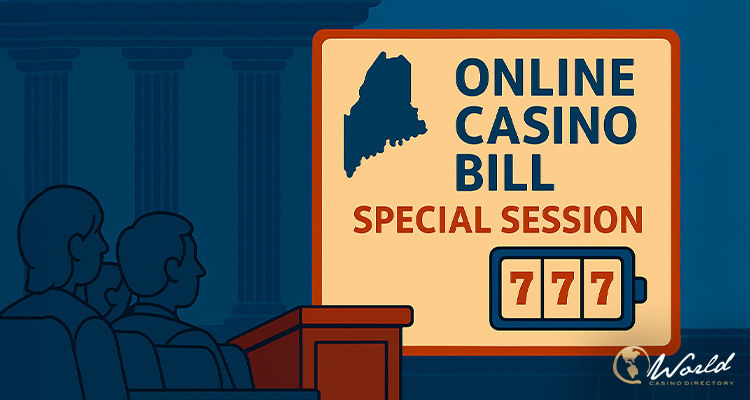Maine legislators are once again evaluating a contentious bill that would significantly broaden the scope of online gambling in the state. Known as Legislative Document 1164 (LD 1164), the proposal aims to empower the state’s four federally recognized tribes—the Penobscot Nation, Passamaquoddy Tribe, Mi’kmaq Nation, and Houlton Band of Maliseet Indians—with exclusive control over online casino gaming.
LD 1164, which had previously been tabled in April, was revived during a special legislative session set to adjourn by June 18. The bill had cleared the Joint Veterans and Legal Affairs Committee with a party-line vote and is now under renewed deliberation. While online sports betting has been legal in Maine since November 2023—and already tied to the tribal nations—this new legislation would further extend that framework to cover online games like poker, blackjack, roulette, and slots.
Rep. Ambureen Rana (D-Bangor) and Sen. Marianne Moore (R-Calais) co-sponsored the bill. If enacted, each of the four tribes would be allowed to contract with a single iGaming operator. Regulation would fall under the Maine Gambling Control Unit, which currently oversees the state’s online sports betting operations. Retail gambling remains under the purview of the state’s Gambling Control Board.
Under LD 1164, online casino gaming would be taxed at a rate of 18%. An estimated $1.8 million could be generated during the 2025–2026 fiscal year, with revenues potentially doubling to $3.6 million by the following year. These funds would be allocated across multiple state programs, including addiction services, opioid treatment, emergency housing, veterans’ care, and school renovations.
Support Rooted in Tribal Sovereignty and Economic Development
Advocates for the measure argue that LD 1164 is not only a financial opportunity but also a step toward addressing long-standing inequities faced by Maine’s tribes. Because of the Maine Indian Claims Settlement Act of 1980 and related federal legislation, the tribes are not treated as sovereign governments in the same way as many other federally recognized tribes across the country.
“This is a matter of economic justice,” said supporters during a public hearing in March, according to Portland Press Herald. Chief William Nicholas Sr. of the Passamaquoddy Tribe at Motahkomikuk highlighted the issue of illegal online gambling already present in the state. “The lost business opportunity for a legal and state regulated entity is in the tens if not hundreds of millions of dollars per year,” he stated in written testimony. “Those revenues should be benefiting Mainers, not shadowy offshore companies or whoever runs the many apps that are currently available for illegal internet gaming.”
Opposition From Casinos, Public Health Officials
However, the proposal has not been met without resistance. Maine’s existing casino operators—Oxford Casino, owned by Churchill Downs, and Hollywood Casino in Bangor, operated by PENN Entertainment—have voiced strong opposition. They argue that granting exclusive rights to the tribes would effectively establish a “monopoly” in the online gambling sector, excluding commercial casinos and possibly diverting their revenue streams.
“This bill would create a gaming monopoly for the Wabanaki Nations with little economic benefit to Maine,” said Dan Walker, a representative from Oxford Casino, during legislative hearings in April.
Major online gaming brands, including BetMGM, FanDuel, and Fanatics, have also called for revisions. These operators are pushing for language that would allow tribes to partner with multiple operators instead of being limited to one, aiming to expand the commercial opportunities under the proposed framework.
Public health voices have also joined the chorus of concern. Puthiery Va, director of the Maine Center for Disease Control and Prevention, warned of potential health ramifications tied to increased gambling access. “Internet gambling is a format that can be isolating, and isolation is a risk factor for poor health outcomes,” Va explained in written testimony. “Electronics, including computers and cellphones, are also isolating and addictive devices, and for that reason there are public health concerns about increasing access to gambling in such a manner that allows for play at all hours with opportunity for impulsive and problem gambling behavior.”
A Familiar Legislative Battle
This is not the first time Maine lawmakers have attempted to legalize online casino gaming. A similar effort last year—LD 1777—also sought to provide exclusive licenses to the Wabanaki Nations but failed narrowly in both chambers of the Legislature. That bill proposed a 10% tax rate, compared to the 16% under LD 1164.
Although LD 1164 has advanced further than its predecessor, it still faces significant hurdles, including the prospect of a veto from Governor Janet Mills, who has previously expressed opposition to expanding gambling in the state.
Still, lawmakers remain divided on the issue as the special session continues. With potential revenues, tribal sovereignty, and social risks all hanging in the balance, the final decision on LD 1164 could reshape Maine’s approach to online gaming—and redefine its relationship with the state’s Indigenous nations.



